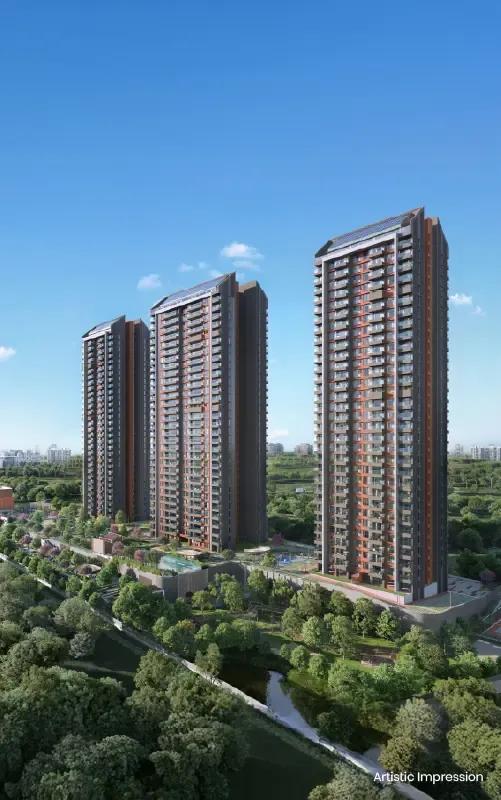4 BHK Property in Electronic City Bangalore – Purva Silversky
If you are exploring a 4 BHK property in Electronic City Bangalore that offers space, privacy, and long-term value, Purva Silversky is designed to meet those expectations. Located off Huskur Road, close to major IT hubs and social infrastructure, this premium residential community combines modern planning with everyday comfort.
Purva Silversky is a thoughtfully crafted development by Puravankara, created for homebuyers who want larger homes without compromising on connectivity. The project focuses on spacious layouts, efficient ventilation, and a calm living environment, making it ideal for families looking to upgrade to a 4 BHK lifestyle in South Bangalore.
Why Choose a 4 BHK Property for Sale in Electronic City?
Electronic City has evolved beyond an IT corridor into a complete residential destination. Choosing a 4 BHK property for sale in Electronic City offers clear advantages for both end users and investors.
Larger homes are increasingly preferred by families that need dedicated spaces for work, study, and leisure. A 4 BHK apartment allows flexibility, whether it is a home office, guest room, or multi-use family space. In Electronic City, this demand is supported by strong employment zones, upcoming metro connectivity, and improving road infrastructure.
Purva Silversky addresses this demand by offering well-planned 4 BHK homes that balance luxury with practicality.
Purva Silversky – Designed for Spacious Living
Purva Silversky stands out among 4 BHK properties for sale in Electronic City due to its emphasis on space efficiency and liveability. Every apartment is planned to maximise usable area, natural light, and airflow.
The layouts ensure:
- Clearly defined living and dining spaces
- Spacious bedrooms with privacy
- Large balconies that extend the living experience
- Practical utility areas for daily needs
These design elements make the homes suitable for both growing families and professionals who work from home.
Strategic Location Advantage in Electronic City Bangalore
Location remains one of the strongest reasons to invest in a 4 BHK property in Electronic City Bangalore, and Purva Silversky benefits from excellent connectivity.
Key location highlights include:
- Quick access to Electronic City Phase 1 and Phase 2
- Close proximity to major IT parks and corporate campuses
- Smooth connectivity to Hosur Road and NICE Road
- Upcoming metro line improving commute times
Educational institutions, hospitals, shopping centres, and entertainment hubs are all within comfortable driving distance, adding to daily convenience.
Amenities That Complement a Premium 4 BHK Lifestyle
A premium home is not just about the apartment but also the lifestyle that comes with it. Purva Silversky offers a curated set of amenities designed for all age groups.
Residents can enjoy:
- A modern clubhouse for social and recreational activities
- Landscaped gardens and open green spaces
- Fitness facilities and walking tracks
- Children’s play areas and family zones
- 24x7 security with controlled access
These features enhance the overall living experience and make Purva Silversky a strong choice among 4 BHK properties for sale in Electronic City.
Investment Potential of 4 BHK Properties in Electronic City
From an investment perspective, 4 BHK property for sale in Electronic City presents steady appreciation potential. Electronic City continues to attract working professionals due to its employment density and infrastructure growth.
Larger homes typically see:
- Higher rental demand from senior professionals and expat families
- Better resale value due to limited supply
- Strong long-term capital appreciation
Purva Silversky, backed by a reputed developer and a well-connected location, aligns well with these investment fundamentals.
Who Should Consider Purva Silversky?
Purva Silversky is well suited for:
- Families upgrading from smaller apartments
- Professionals working in Electronic City and nearby tech hubs
- Buyers seeking a premium 4 BHK property with future value
- Investors looking for stable returns in South Bangalore
The project offers a balance of comfort, location, and brand reliability.
If you are looking for a 4 BHK property in Electronic City Bangalore that combines space, connectivity, and long-term value, Purva Silversky is worth exploring.
Schedule a site visit today to experience the layouts, amenities, and location advantages firsthand.
Enquire now to get detailed floor plans, pricing, and availability for 4 BHK homes at Purva Silversky.
FAQs
Frequently Asked Questions
Yes, Purva Silversky is a strong option if you are specifically looking for a 4 BHK property in Electronic City Bangalore that offers both space and long-term value. The project is planned with large, well-defined layouts that suit modern family needs, including work-from-home flexibility. Its location off Huskur Road provides easy access to Electronic City while maintaining a relatively peaceful residential environment. Backed by Puravankara’s reputation for quality and timely delivery, the project offers confidence for both end users and investors.
Yes, the 4 BHK properties for sale in Electronic City at Purva Silversky are especially suitable for families. The apartments are designed to accommodate multi-generational living, with spacious bedrooms, large living areas, and practical utility spaces. Open green areas, children’s play zones, and internal walkways create a family-friendly environment. The availability of nearby schools, hospitals, and daily conveniences further supports comfortable family living.
Connectivity is one of the key advantages of investing in a 4 BHK property for sale in Electronic City at Purva Silversky. The project is well connected to Electronic City Phase 1 and Phase 2, making daily commutes easier for professionals working in major IT parks. Hosur Road offers direct access to central Bangalore, while NICE Road improves cross-city travel. The upcoming metro line is expected to further reduce travel time and enhance overall accessibility.
Yes, investing in a 4 BHK property in Electronic City Bangalore offers solid long-term potential due to continuous infrastructure development and strong employment demand. Larger homes tend to attract stable end users and premium tenants, which supports better rental yields and resale value. Purva Silversky benefits from limited availability of large-format homes in this micro-market, making it a compelling option for buyers focused on appreciation and long-term returns.
Purva Silversky differentiates itself from other 4 BHK properties for sale in Electronic City through a combination of thoughtful design, efficient space planning, and brand credibility. Unlike many developments that focus only on unit count, this project emphasises open spaces, natural ventilation, and lifestyle amenities. The balance between premium living and everyday practicality, along with Puravankara’s track record, makes it a more dependable choice compared to many standalone projects in the area.



